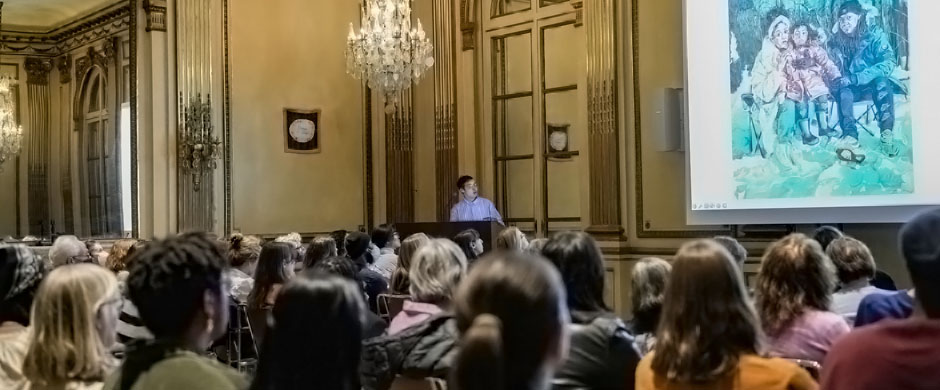 | IN DISCUSSION
| IN DISCUSSION

Public Programs
The Institute: your destination for the past, present, and future of art.
Connect to the latest thinking about the arts from ancient times to tomorrow’s prospects. Become part of the conversation, choose from our extensive range of lecture series, special lectures, panel discussions, workshops, and conferences.
sign up for our mailing listAdvance registration is required to attend Institute events. Please check this webpage for registration and other updates. Many of our recent lectures are available to watch online in our events archive.
As a participant in our public programs, we ask that you review and abide by the Institute's Community Standards Policy which provides for a positive and educational experience for all of our guests.
2025 Calendar
June
Thursday, June 26, 2025, 5:00-8:00pm
Friday, June 27, 2025, 3:00-8:00 pm
Title: Women and Abstractions in
Postwar Americas Symposium
Art at Americas Society, in collaboration with the Institute of Fine Arts at NYU, is pleased to present “Women and Abstractions in Postwar Americas,” a two-day symposium examining the contributions of women to postwar abstraction across the Americas. Join us in person or online for afternoon and evening sessions hosted at both Americas Society and The Institute of Fine Arts. The program will feature twelve speakers presenting a range of perspectives including a keynote presentation by Mónica Amor.
This symposium is organized in conjunction with the exhibition Fanny Sanín: Geometric Equations curated by Edward J. Sullivan.
Sanín's sustained and powerful engagement with geometric abstraction since her move to New York from Colombia in 1971 stands as a testament to how artists like her persevered in their formal investigations, despite facing exclusion from the art world and navigating its ever-evolving trends. We hope this symposium will foster a dialogue and comparison of the practices of postwar women-identifying artists from diverse geographies and contexts, examining their contributions to various forms of abstraction.
Speakers
Susan L. Aberth, Edith C. Blum Professor of Art History and Visual Culture, Bard College
Mónica Amor, Keynote Speaker | Professor, Maryland Institute College of Art
Laura Anderson Barbata, Transdisciplinary Artist
Francesca Ferrari, Postdoctoral Fellow, Leonard A. Lauder Research Center for Modern Art, Metropolitan Museum of Art
Elizabeth Ferrer, Independent Curator
Ana M. Franco, Associate Professor, Department of Art History, Universidad de los Andes
Vivian Li, The Lupe Murchison Curator of Contemporary Art
Mary-Kate O’Hare, Executive Director and CEO, Bruce Museum
Delia Solomons, Associate Professor of Modern and Contemporary Art, Drexel University
Rachel Vorsanger, PhD Candidate, Temple University
Manuela Well-Off-Man, Art Historian and Chief Curator, IAIA Museum of Contemporary Native Arts
Zuna Maza, Assistant Curator, El Museo del Barrio
Remarks by
Aimé Iglesias Lukin, Director and Chief Curator of Art at Americas Society in New York
Edward J. Sullivan, Helen Gould Shepard Professor in the History of Art at the Institute of Fine Arts and College of Arts and Sciences, New York University
The events calendar is subject to change. Please check this webpage for updates.
Annual Lecture Series